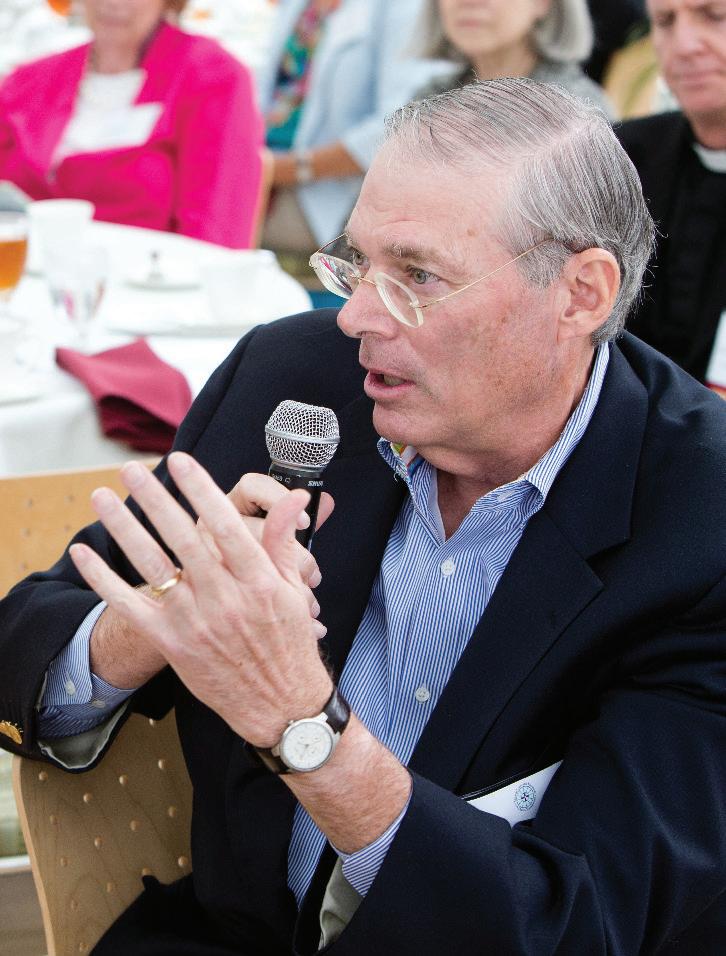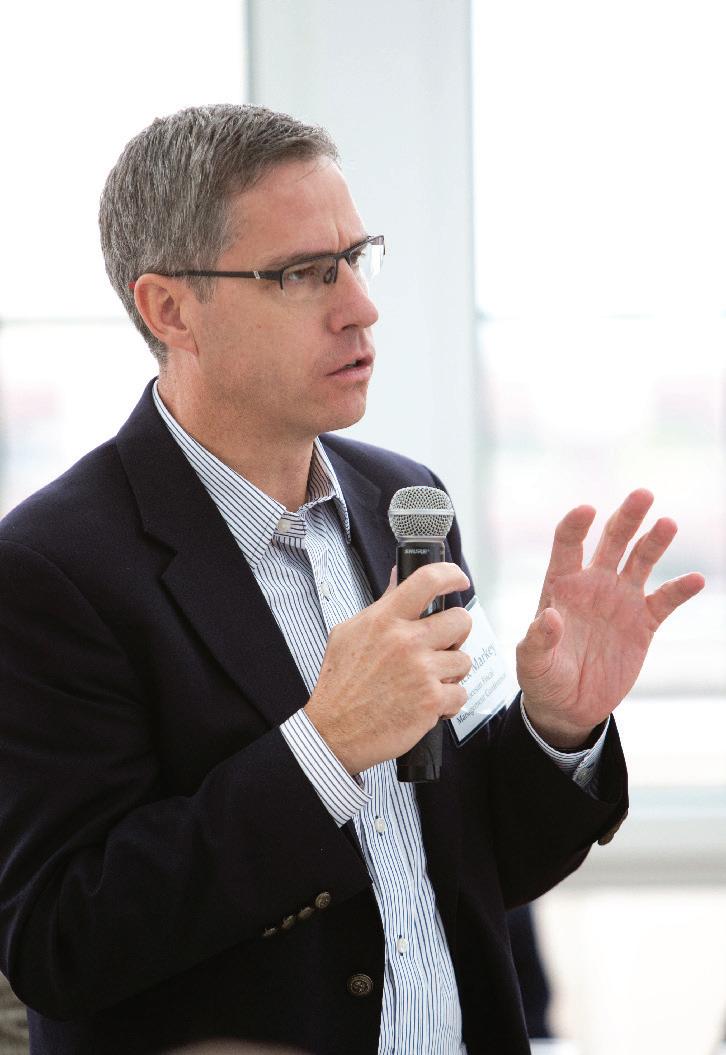
4 minute read
SELECTED QUESTIONS, ANSWERS, AND COMMENTS
Susan King
Dean, School of Journalism, University of North Carolina Chapel Hill
I’d like to ask Elizabeth about the culture of resistance to the significant changes she’s described. I can’t imagine this happening without some kind of pushback.
Elizabeth Mccaul
It’s true that with any reform effort you see resistance. It’s human nature to resist change. The Holy Father said on the banking issue, “Pray for me.” I’m very optimistic. I see that the major recommendations coming out of the Pontifical Commission for Reference on the Organization of the Economic- Administrative Structure of the Holy See (COSEA) have come to life with Cardinal [George] Pell [named by Pope Francis to the position of Prefect for the Economy of the Holy See with responsibility for reforming the Vatican’s finances and administration], and that he thinks like a Minister of the Economy -- in our language -- and in a way that was never structured before. So, having a senior leader like Cardinal Pell as a Minister of the Economy responsible for budget, regulation, transparency and integrity of financial systems is a huge first step. And he’s off to an incredible start. But it won’t be easy.
Geoff Boisi
Chairman and Chief Executive Officer, Roundtable Investment Partners, LLC.
The way the Pope has articulated some of his thoughts on capitalism has raised ques- tions in the minds of philanthropists who, as we all know, are so important to the Catholic Church in the U.S. and around the world. Can you enlighten us on what he’s really thinking? Where is he coming from on this issue?

REV. HEHIR
He has adopted the style of the interview. And I think partly out of his pastoral style and his experience as a Latin American bishop he speaks very directly to questions of justice and injustice. In other words, he has a very profound sense of how much suffering there is in the world, and a lot of it is couched in economic terms. But he doesn’t play out the implications of his direct statements. For example, he says that inequality is the source of every conflict in the world. To be honest, I have a lot of colleagues at the Kennedy School who would take him up on that. They’d say, ‘That’s too broad a statement. There are other things that feed into the conflicts in the world, and inequality is just one of them.’ So you need to contextualize.
Elizabeth Mccaul
The Pope recently gave a sermon about the evils of speculation. And he spoke especially about speculators in Catholic society and the commodity markets, especially food. He was very specific in saying this is a force that needs to be undone -- that food speculation is causing even greater hunger among the poor because it’s causing the price of food to rise exponentially. So he’s carving out a place in the definition of what an economy should be and what’s acceptable. It doesn’t matter if you’re a capitalist or not. He’s challenging us to think about our form of capitalism differently, and I believe it’s time to do that.
PATRICK MARKEY Executive Director, Diocesan Fiscal Management Conference

I have several questions around Cardinal Pell and the new Council for the Economy. Will there be an internal audit function at the Vatican; what are they learning insofar as accountability and standards; and will there be investment guidelines?
Elizabeth Mccaul
There’s definitely an internal audit function being developed as part of the new economic and administrative structure in the Vatican, and the intention is to give it access to the books. The balance sheet that’s been published has been very controversial, as I think most of you know. So, there is definitely a very strong mandate to do a full internal audit and then create an overall budget for the Vatican City State and the Holy See.
Your other question was on accountability. It remains to be seen whether the Council for the Economy will have operational oversight. My personal view is not to make the Council for the Economy operational over foundations, the dicasteries, et cetera, but rather to set the standards and then empower other operational agencies, not unlike the way the GAO functions in this country. The Treasury itself sets policy; it’s not operational. If it gets involved in procurement or the management and maintenance of real estate it ends up being a mess.
On the subject of investments, I think we’ll have to pay close attention to what the Holy Father has to say about what are proper investments for the Church to hold. And my hope is that you’ll see the Vatican leading the way.
MOST REV. JOHN BARRES Bishop, Diocese of Allentown
Could you comment, Father Bryan, on Pope Francis’s style and substance during his trip to the Middle East?
REV. HEHIR
Popes come to office like presidents, with a background and a focus. My sense is the Pope’s passion is poverty and socio-economic issues. So that’s what you’re getting. But I think every Pope has to be a good pastor, a good administrator, and a good diplomat. There’s no way you can escape the third characteristic because you’re runFROM ning a diplomatic tour around the world. So when he went to the Middle East, I figured this is really not his strong suit. I mean, Pius XII was a diplomat all his life. Paul VI was a diplomat. John XXIII was a diplomat. They all spent their lives in the Vatican diplomatic corps. And John Paul II had been a political Pope in Poland. But I think what Pope Francis did was move away from the practical specifics of diplomacy.
I know the United States Government and a lot of other people wanted him to endorse the two-state solution. He might have done something in private, but in public, it was all symbolic. So, he kissed the Wall, and then balanced that with going to the graves of Mount Herzl in Israel. And then, quite unexpectedly, invited the president of Israel and the president of the Palestinians to Rome, not to do diplomacy, but to pray. Those three things are not going to solve the problems in the Middle East, but they did make an effort to shake loose a situation that’s now frozen.
National Leadership Roundtable on Church Management







